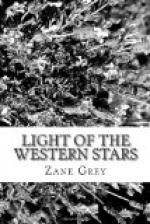All the while this ceaseless activity was going on there was a strange uproar—bawl and bellow, the shock of heavy bodies meeting and falling, the shrill jabbering of the vaqueros, and the shouts and banterings of the cowboys. They took sharp orders and replied in jest. They went about this stern toil as if it were a game to be played in good humor. One sang a rollicking song, another whistled, another smoked a cigarette. The sun was hot, and they, like their horses, were dripping with sweat. The characteristic red faces had taken on so much dust that cowboys could not be distinguished from vaqueros except by the difference in dress. Blood was not wanting on tireless hands. The air was thick, oppressive, rank with the smell of cattle and of burning hide.
Madeline began to sicken. She choked with dust, was almost stifled by the odor. But that made her all the more determined to stay there. Florence urged her to come away, or at least move back out of the worst of it. Stillwell seconded Florence. Madeline, however, smilingly refused. Then her brother said: “Here, this is making you sick. You’re pale.” And she replied that she intended to stay until the day’s work ended. Al gave her a strange look, and made no more comment. The kindly Stillwell then began to talk.
“Miss Majesty, you’re seein’ the life of the cattleman an’ cowboy—the real thing—same as it was in the early days. The ranchers in Texas an’ some in Arizona hev took on style, new-fangled idees thet are good, an’ I wish we could follow them. But we’ve got to stick to the old-fashioned, open-range round-up. It looks cruel to you, I can see thet. Wal, mebbe so, mebbe so. Them Greasers are cruel, thet’s certain. Fer thet matter, I never seen a Greaser who wasn’t cruel. But I reckon all the strenuous work you’ve seen to-day ain’t any tougher than most any day of a cowboy’s life. Long hours on hossback, poor grub, sleepin’ on the ground, lonesome watches, dust an’ sun an’ wind an’ thirst, day in an’ day out all the year round—thet’s what a cowboy has.
“Look at Nels there. See, what little hair he has is snow-white. He’s red an’ thin an’ hard—burned up. You notice thet hump of his shoulders. An’ his hands, when he gets close—jest take a peep at his hands. Nels can’t pick up a pin. He can’t hardly button his shirt or untie a knot in his rope. He looks sixty years—an old man. Wal, Nels ’ain’t seen forty. He’s a young man, but he’s seen a lifetime fer every year. Miss Majesty, it was Arizona thet made Nels what he is, the Arizona desert an’ the work of a cowman. He’s seen ridin’ at Canyon Diablo an’ the Verdi an’ Tonto Basin. He knows every mile of Aravaipa Valley an’ the Pinaleno country. He’s ranged from Tombstone to Douglas. He hed shot bad white men an’ bad Greasers before he was twenty-one. He’s seen some life, Nels has. My sixty years ain’t nothin’; my early days in the Staked Plains an’ on the




